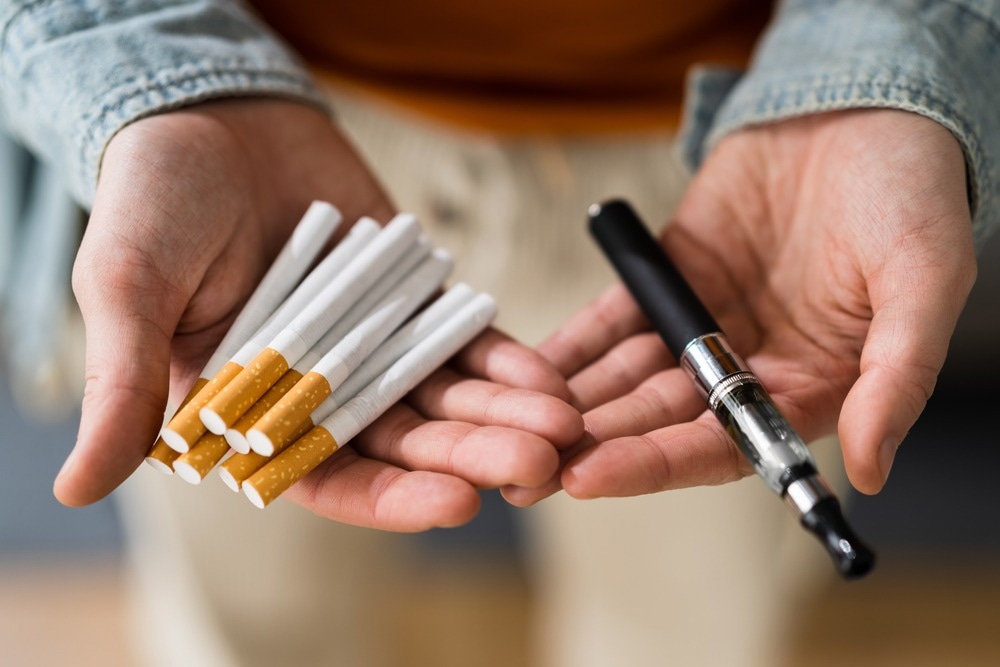The rapid outbreak of the severe acute respiratory syndrome coronavirus 2 (SARS-CoV-2) resulted in the coronavirus disease 2019 (COVID-19) pandemic, which has already claimed over 6.8 million lives worldwide.
Several studies have presented controversial results regarding the impact of tobacco cigarette (TCIG) smoking and electronic cigarette (ECIGs) vaping on COVID-19 manifestation. Nevertheless, it is important to understand how TCIGs and ECIGs affect an individual with SARS-CoV-2 infection.

Study: Ectodomain shedding of proteins important for SARS-CoV-2 pathogenesis in plasma of tobacco cigarette smokers compared to electronic cigarette vapers: a cross-sectional study. Image Credit: Andrey_Popov / Shutterstock.com
Background
Even though similar levels of cotinine, which is a metabolite of nicotine, have been found in both smokers and vapers, ECIG emissions contain fewer non-nicotine toxicants as compared to TCIG emissions. Interestingly, one previous study proposed that nicotine possesses protective and anti-inflammatory effects against severe COVID-19 pathogenesis.
It is unknown whether vaping with limited non-nicotine toxicants manifests similar risks as TCIG smoking in the progression of SARS-CoV-2 infection and cardiovascular problems linked to post-acute COVID-19 syndrome (PACS) or long COVID.
The enhanced soluble plasma levels of shed proteins indicate increased cellular activity of proteins in less available epithelial cells. These protein levels also reflect the systemic effects of TCIG smoking and ECIG vaping toxicity on cellular and tissue levels.
To establish SARS-CoV-2 infection, the SARS-CoV-2 spike protein binds to the angiotensin-converting enzyme 2 (ACE2) receptor of the host, with the subsequent fusion of membranes. ACE2 shedding by lung epithelial cells is facilitated by the tumor necrosis factor-alpha-converting enzyme ADAM17 metalloproteinase. Although the exact role of ACE2 in ectodomain shedding in COVID-19 is not yet elucidated, their interaction has been found to be a key regulator of the infection.
Plasma levels of ACE2 reflect the systemic toxicity of TCIG smoking and ECIG vaping. During SARS-CoV-2 infection, angiotensin (Ang) II, the ligand of ACE2 that is expressed in many cells and tissues, is associated with the regulation of inflammatory responses. However, it is not known whether enhanced oxidative stress in TCIG smokers triggers the ectodomain shedding of proteins that is mediated by ADAM17 activity, which may impact COVID-19 pathogenesis.
About the study
To understand the impact of TCIG smoking and ECIG vaping on COVID-19, scientists compared the levels of proteins due to ectodomain shedding in the plasma, which is significant for SARS-CoV-2 pathogenesis. The protein levels were also determined among non-smokers and non-vapers.
In this study, plasma samples were collected from 45 non-smokers, 30 ECIG vapers, and 29 TCIG smokers. Both male and female candidates between the ages of 21 years and 45 years were recruited.
All participants were asked to refrain from smoking 12 hours before the collection of plasma samples. Dual users, which included those who used both ECIG and TCIG, were excluded from the study.
About 9% of non-smokers and 66% of ECIG vaper users were former TCIG smokers. However, all of them quit at least one year before the study.
Study findings
The current study is the first to investigate the impacts of TCIG smoking and ECIG vaping on ectodomain shedding of ACE2, furin, Ang II, Ang 1–7, IL-6R, sCD163, L-selectin proteins, all of which are crucial for SARS-CoV-2 pathogenesis. Both TCIG smokers and ECIG vapers exhibited similar plasma cotinine levels, thereby implicating non-nicotine pro-oxidant toxicants to be the instigators of increased levels of these proteins.
The authors of this study proposed unique immunomodulatory mechanisms in TCIG smokers that enhance the risk of severe COVID-19 as compared to non-smokers. The plasma levels of sCD163 and L-selectin were found to be higher in TCIG smokers as compared to non-smokers, which might be due to the upregulation of ADAM17 by TCIG smoking. An enhanced ADAM17 sheddase activity contributes to severe COVID-19 pathogenesis.
These findings are consistent with previous research revealing an increased level of ADAM17 in the blood immune cells of TCIG smokers but not in ECIG vapers. An elevated level of sCD163 was also observed in TCIG smokers as compared to ECIG vapers and non-smokers.
In addition, membrane levels of CD163 on myeloid cells were lower among TCIG smokers, which indicates the increased cellular activity of ADAM17 on macrophages and higher levels of shed sCD163 in plasma. Importantly, no elevation of CD163 was observed among ECIG vapers.
Increased levels of L-selectin and plasma furin were observed in TCIG smokers as compared to ECIG vapers and non-smokers. The plasma levels of interleukin 6 (IL-6)/IL-6Rα complex, ACE2, and Ang II remained similar among the different smoker groups.
Conclusions
This study has some limitations including a small sample size and analysis of readily accessible plasma instead of less accessible tissues, such as lung epithelial tissues. Despite the limitations, the study demonstrated that the levels of some ADAM17 targets were elevated in the plasma of TCIG smokers as compared to non-smokers.
In the future, more research is needed to evaluate whether increased innate immune responses and ADAM17 activity influence severe COVID-19 in healthy young TCIG smokers without apparent prior medical conditions.
Journal reference:
- Kelesidis, T., Sharma, M., Satta, S., et al. (2023) Ectodomain shedding of proteins important for SARS-CoV-2 pathogenesis in plasma of tobacco cigarette smokers compared to electronic cigarette vapers: a cross-sectional study. Journal of Molecular Medicine. doi:10.1007/s00109-023-02286-8